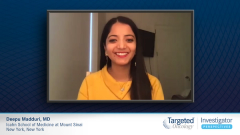
Rapidly Evolving Landscape for R/R Multiple Myeloma
Deepu Madduri, MD, details the efficacy data from the phase 1b/2 CARTITUDE-1 study of ciltacabtagene autoleucel (cilta-cel) for relapsed/refractory multiple myeloma.
Deepu Madduri, MD: The future of relapsed/refractory multiple myeloma is rapidly changing, particularly with all of the new BCMA trials that we have. We also have new constructs, such as GPRC5D, and we also have JNJ-64007957 [teclistamab]. Both of these therapies are being studied in various combinations, including with pomalidomide and daratumumab. It will be interesting to see what happens when you combine a bispecific with other agents that are already approved for multiple myeloma.
We also have new targets. One that Adam Cohen, MD, presented on at ASH [the American Society of Hematology annual meeting] is called FcRH5. That’s another agent that’s not a BCMA that is also expressed on multiple myeloma cells.
I think the field is rapidly changing. There’s a lot going on with combining IMiDs [immunomodulatory imide drugs] with CAR [chimeric antigen receptor] T-cell therapy, or IMiDs with BCMA, bispecifics. There’s also talk about doing autologous transplant and then potentially doing CAR T as consolidation therapy. So the field is rapidly changing, and we have a lot of new studies to look forward to.
In multiple myeloma, we still have an unmet need. We haven’t found a cure for this disease. We’re working tirelessly with all of these different combinations, and I feel like we’re one step closer to a cure. We’re seeing deep and durable responses in these patients who are heavily pretreated. I feel like once we get a handle on it, try to tweak it a little, maybe we’ll get closer and closer to getting that cure that our patients really need.
For community oncologists who are treating patients with relapsed and refractory myeloma, one thing I would say is get in touch with an academic center earlier. Make sure you get cell phone numbers for some of the myeloma doctors who are treating. We’re always happy to touch base with you to discuss what therapies the patient is on, letting you guys know if there are any new clinical trials coming along.
It’s often better to start referring the patient before they’ve relapsed after all 3 lines of therapy. That way, if you are thinking about a CAR T-cell therapy for a patient, they are on our radar and can be put on a waitlist to get one of these therapies, rather than waiting until they’ve progressed and their numbers may not meet clinical trial requirements. I think the best thing for doctors to do is keep in constant communication with an academic center, understanding all of the new trials going on, and make sure you refer patients early so they can get the best therapy they need, when they need it.
Transcript edited for clarity.


















